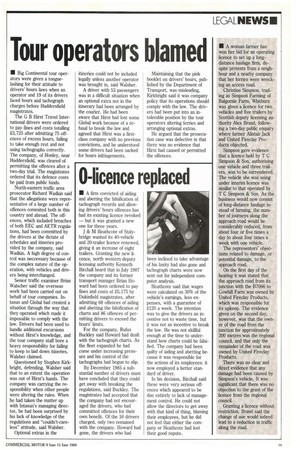Tour operators blamed
Page 23

If you've noticed an error in this article please click here to report it so we can fix it.
• Big Continental tour operators were given a tonguelashing for their attitude to drivers hours laws when an operator and 19 of its drivers faced hours and tachograph charges before Huddersfield magistrates.
The G B Hirst Travel International drivers were ordered to pay fines and costs totalling 0,725 after admitting 75 offences of excess hours, failing to take enough rest and not using tachographs correctly. The company, of Honley, near Huddersfield, was cleared of permitting the offences after a two-day trial. The magistrates ordered that its defence costs be paid from public funds.
North-eastern traffic area prosecutor Richard Wadkin said that the allegations were representative of a large number of offences commited both in this country and abroad. The offences, which included breaches of both EEC and AETR regulations, had been committed by the drivers at the dictate of schedules and itineries provided by the company, said Wadkin. A high degree of control was neccessary because of the complex nature of the operation, with vehicles and drivers being interchanged.
Senior traffic examiner Brian Walscher said the overseas work had been carried out on behalf of tour companies. Intasun and Global had created a situation through the way that they operated which made it impossible to comply with the law. Drivers had been used to handle additional excursions without Hirst's knowledge, and the tour company staff bore a heavy responsibility for failing to keep to laid down itineries, Walsher claimed.
Questioned by Stephen Kirkbright, defending, Walsher said that to an extent the operation was out of Hirst's hands. The company was carrying the responsibility when other people were altering the rules. When he had taken the matter up with Intasun's managing director, he had been surprised by his lack of knowledge of the regulations and "couldn't-careless" attitude, said Walsher.
Optional extras in the itineries could not be included legally unless another operator was brought in, said Walsher.
A driver with 53 passengers was in a difficult situation when an optional extra not in the itinerary had been arranged by the courier. He had been aware that Hirst had lost some Global work because of a refusal to break the law and agreed that Hirst was a firstclass company with no previous convictions, and he understood some drivers had been sacked for hours infringements. Maintaining that the pink booldet on drivers' hours, published by the Department of Transport, was misleading, Kirkbright said it was company policy that its operations should comply with the law. The drivers had been put into an intolerable position by the tour operators altering ferries and arranging optional extras.
He argued that the prosecution case was defective in that there was no evidence that Hirst had caused or permitted the offences.
















































































































